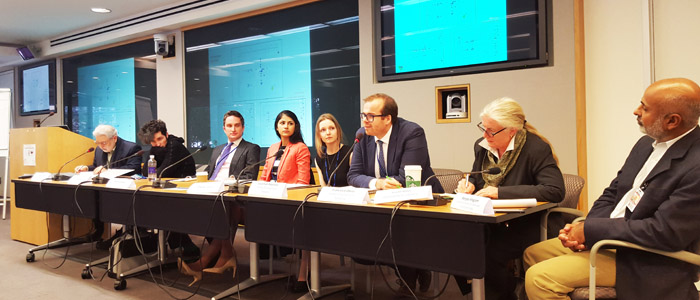
GDN co-organized and presented at a panel on "The Future of Data for Development" at the Civil Society Policy Forum on the sidelines of the Spring 2016 World Bank-IMF meetings in April. The panel gathered organizations operating at every point of the data chain -- from collection to analysis, research communication and policy, to global coordination on data for sustainable development.
The panel addressed the urgent need to balance the proliferating and increasingly sophisticated supply of data with a critical demand among decision-makers at all levels, from individuals to governments.
Susannah Robinson, one of 13 winners of GDN's Next Horizon Essay Contest on the Future of Development Aid (2014), discussed the various options international organizations can yield to facilitate a '360 degree' information loop from the community level -- where the users of services operate -- to service provider and regulatory agencies, particularly in the medical field.
Francesco Obino, Program Manager at GDN, highlighted the importance of combining global excellence and innovation in the data field with research capacity building in developing countries, where different ways of working with data can be used to inform better decision-making for development.
Other panelists included Sanjeev Khagram, coordinator fo the Global Partnership for Sustainable Development Data, who emphasized the need to build trust among data stakeholders to move towards the creation of a data ecosystem, in a context where privacy and data security remain largely unregulated. Development Gateway's Advisor and veteran health specialist Susan Stout stressed the importance of effective data use over sophistication, particularly when data is intended to improve service delivery in technology-poor settings. San Francisco-based Premise described how image-based data collection using basic cellphones and involving community members enabled the Philippines government to virtually stop the sale of single-stick cigarettes in 18 months, a tactic that aims to prevent tobacco addition among minors in particular. New York-based Locus Analytics showed how network mapping technology can help compare the characteristics of economic activities across sectors and geographies, pointing to policy opportunities to boost economic development in the most diverse settings.
Members of the audience raised questions on the changing agency of community members, national statistical offices and researchers in an data-driven age of development, and how data can benefit the most vulnerable populations: migrants, refugees and people living in conflict.
Jean-Louis Sarbib, CEO of Development Gateways and panel chair, summarised the discussion by urging further conversations on a 'data revolution', to address the timely questions, 'data for whom?' and 'data for what?'.
Read Susannah Robinson's winning essay from GDN's Next Horizon Essay Competition organised in 2014-15, with the support of the Bill and Melinda Gates Foundation: “What goes up, must come down”: The role of open data in improving aid accountability."
